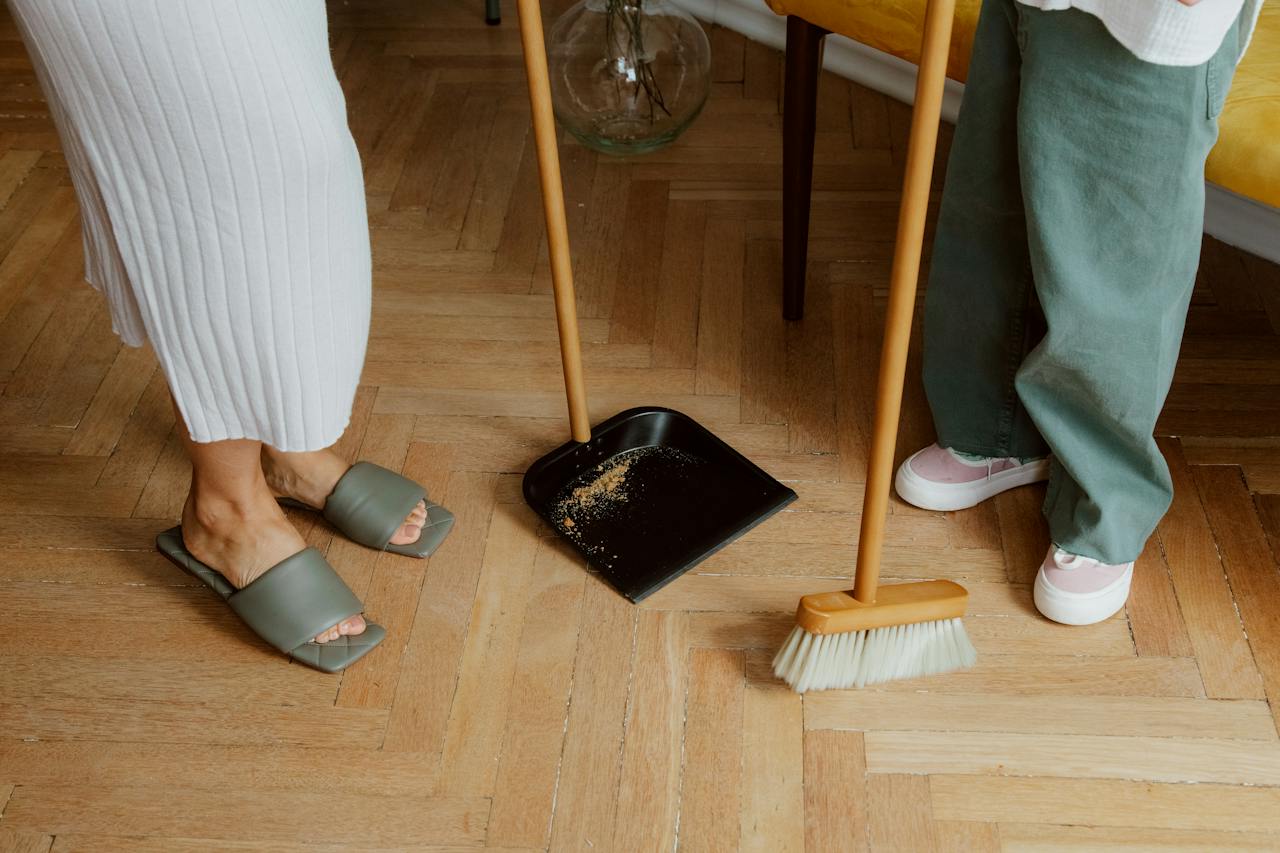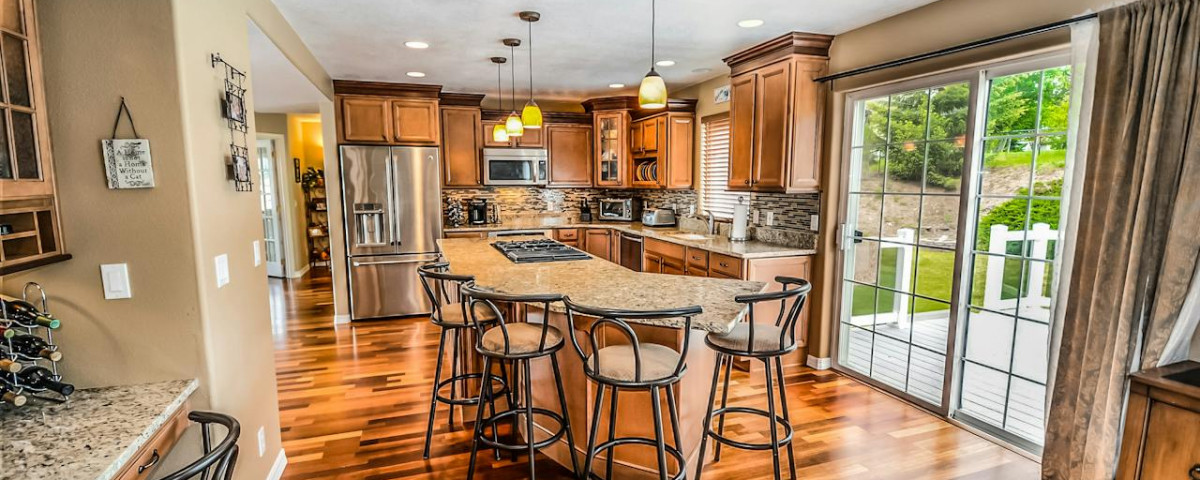- Call Today
- 020 3637 8979
Cleaning Hardwood Floors: Maintenance Tips and Common Mistakes

Packing and Storing: Cleaning Tips Before Box Placement
January 9, 2024
Quick and Efficient Kitchen Cleaning Hacks for Busy Mondays
February 29, 2024Hardwood floors add a touch of elegance and warmth to any home, but proper maintenance is crucial to keep them looking their best. Preserving the beauty of your hardwood floors is more than just a cosmetic concern; it’s an investment in the longevity and appeal of your living space. In this comprehensive guide, we’ll explore essential maintenance tips and highlight common mistakes to avoid when cleaning hardwood floors, ensuring your hardwood floors remain a timeless feature in your home.
Understanding Hardwood Floors
Understanding hardwood floors is key to their proper maintenance and longevity. With two primary types, solid hardwood, and engineered hardwood, each brings its own unique charm to a living space. Solid hardwood, crafted from a single piece of wood, exudes timeless beauty, while engineered hardwood, constructed in layers, offers enhanced durability and resistance to environmental changes.
Characteristics of Solid Hardwood
It’s vital to understand the unique characteristics of hardwood. Hardwood floors are sensitive to moisture, which can cause them to warp or buckle. Additionally, they are prone to scratches, necessitating a proactive approach to protection and care. By embracing preventative measures such as using furniture pads and strategically placing rugs in high-traffic areas, you protect against scratches and enhance the longevity of your solid hardwood floors. In essence, understanding these characteristics empowers you to enjoy the enduring beauty of solid hardwood while adopting practices that safeguard its innate elegance for years to come.
Characteristics of Engineered Hardwood
The characteristics of engineered hardwood flooring set it apart as a versatile and resilient option for homeowners seeking both aesthetics and durability. Unlike solid hardwood, engineered hardwood is crafted in layers, providing enhanced stability against changes in temperature and humidity. This engineered construction makes it ideal for areas with fluctuating environmental conditions, such as basements or kitchens. Additionally, engineered hardwood showcases remarkable resistance to moisture-related issues, reducing the risk of warping or buckling. Its layered composition also contributes to increased resistance to scratches and dents, making it a practical choice for high-traffic spaces.
Maintenance Tips for Hardwood Floors
Hardwood floors are more than just a surface; they’re an investment in the character and charm of your home. Adopting proper maintenance practices is essential to ensure they retain their timeless allure. Let’s delve into practical tips that will keep your hardwood floors looking their best.
Regular Cleaning Routine
Sweeping and vacuuming on a regular basis form the cornerstone of hardwood floor maintenance. When cleaning hardwood floors, use a soft-bristle broom or a vacuum with a hardwood floor attachment to whisk away loose dirt and prevent scratches. Damp mopping, while effective, requires a cautious approach. Ensure your mop is well-wrung, leaving it slightly damp, and use a hardwood-specific cleaner to maintain that flawless finish.
Appropriate Cleaning Products
Choosing the right cleaning solutions is pivotal to preserving the natural beauty of your hardwood floors. When cleaning hardwood floors, opt for pH-neutral or hardwood-specific cleaners, steering clear of harsh chemicals that can compromise the wood’s integrity. While homemade cleaners may seem appealing, it’s wise to err on the side of caution and select high-quality commercial cleaners designed for your specific hardwood type.
Maintenance Tips for Engineered Hardwood Floors
Engineered hardwood floors offer a perfect blend of elegance and durability. So, let’s explore some practical tips to ensure your engineered hardwood floors maintain their allure for years to come.

Regular Cleaning Routine
Safeguarding your engineered hardwood begins with a regular cleaning routine. Sweeping or vacuuming with a hardwood floor attachment helps rid the surface of dirt and debris that can lead to scratches. When damp mopping, use a well-wrung mop with a suitable hardwood floor cleaner to avoid excess water. Unlike solid hardwood, engineered floors are more moisture-resistant, but it’s wise to exercise moderation to prevent any potential issues.
Appropriate Cleaning Products
Choosing the right cleaning products is crucial for preserving the beauty and integrity of engineered hardwood. When cleaning hardwood floors, use a pH-neutral or specifically formulated hardwood floor cleaner to maintain a clean surface without compromising the engineered layers. Steer clear of harsh chemicals that may cause damage. While homemade cleaners are popular, sticking to reliable commercial cleaners designed for engineered hardwood is advisable.

Hiring Professional Cleaners
While regular maintenance is something you can handle at home, hiring professional cleaners for deep cleaning ensures a thorough job without risking damage. Professionals have the expertise and tools to clean and rejuvenate your hardwood floors effectively. Beyond routine cleaning, professionals can also guide you on additional measures to protect floors when moving. As you prepare to move, consider it an investment in the longevity of your hardwood floors, ensuring they continue to be a source of beauty and pride in your new living space.
Common Mistakes to Avoid When Cleaning Hardwood Floors
Water and hardwood floors are not the best of friends. Excessive water can seep into the wood, causing swelling, warping, and irreversible damage. Promptly wipe away spills and resist the temptation to use a soaking wet mop on your precious floors.
Proper Techniques for Minimising Water
When damp mopping, ensure your mop is well-wrung, leaving it slightly damp. Steer clear of steam cleaners, as the high heat and moisture can be detrimental to the wood. Opt for gentle cleaning methods to preserve the integrity of your hardwood floors.
Impact on Hardwood Finish
Harsh cleaning agents, such as ammonia or bleach, can strip away the protective finish of your hardwood floors. This leaves the wood vulnerable to scratches, stains, and other forms of damage. Choose mild and specifically formulated hardwood floor cleaners over harsh chemicals. These alternatives effectively clean the surface without compromising the finish or the wood itself.
Long-Term Care and Protection
Take preventative measures to protect your hardwood floors. Place furniture pads under the legs of chairs, tables, and other heavy furniture to prevent scratches and dents. Additionally, strategically placing rugs in high-traffic areas can add an extra layer of protection. Periodically inspect your hardwood floors for signs of wear and tear. Look out for scratches, dents, or changes in colour. Addressing these issues can prevent further damage and extend the life of your floors. Over time, the protective finish on your hardwood floors may wear off. Periodic refinishing can revitalise the appearance and provide additional protection. Consult with professionals to determine the optimal refinishing schedule for your specific flooring.
Conclusion
In conclusion, maintaining hardwood floors’ timeless beauty involves proper cleaning techniques, careful product selection, and preventive measures. By understanding the nuances of hardwood and avoiding common mistakes when cleaning hardwood floors, you can enjoy the warmth and elegance of your hardwood floors for years to come. Embrace these maintenance tips, and let your hardwood floors shine with the radiance they deserve.


